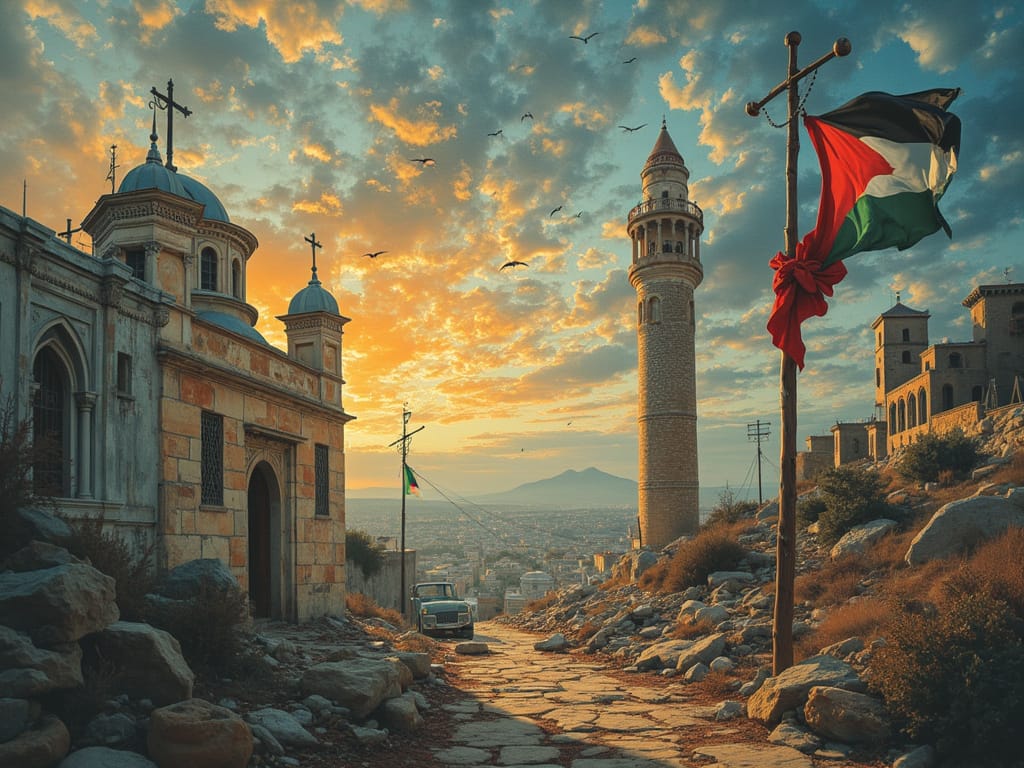

By Dr. Tim Orr
The Israel-Gaza conflict is one of the most complex and contentious issues in the modern world, deeply affecting the lives of millions. For missionaries, this conflict poses a unique challenge. How should they respond? How do they navigate the suffering on both sides, the religious and political divides, and the call to share the gospel? The narratives they adopt shape their understanding of the conflict and their approach to ministry. Whether through the lens of compassion, fear, or geopolitics, these narratives influence their views of the conflict and how they engage with the people affected. Understanding the power of these narratives is crucial for missionaries seeking to bring the light of Christ into a situation marked by violence and division.
How Narratives Shape Our Thinking
Narratives are powerful tools that shape the way we see the world. They provide a framework for interpreting complex events, offering meaning and coherence to what might otherwise seem chaotic. In the case of the Israel-Gaza conflict, missionaries' narratives can significantly influence their understanding of the situation and their responses. Religious beliefs, cultural backgrounds, political affiliations, and personal experiences often shape these narratives. Whether missionaries approach the conflict from a humanitarian standpoint, through geopolitical lenses, or with deeply embedded theological views, the narratives they embrace act as a filter through which they process the conflict and decide how to engage. Understanding the nature of these narratives is critical to ensuring that missionaries remain faithful to their calling while navigating the complexities of this ongoing crisis.
1. The Compassion Narrative: Gospel and Humanitarian Focus
The Compassion narrative emphasizes a gospel-centered and Christ-like response to the Israel-Gaza conflict. Missionaries who adopt this perspective are primarily concerned with bringing the love of Christ to all parties involved—Jews, Muslims, and Christians alike. At the heart of this narrative is a dual commitment to sharing the gospel and addressing the humanitarian needs of those suffering in the conflict.
Gospel-Driven Ministry
For missionaries in the Compassion narrative, the gospel is central. They see the Israel-Gaza conflict not as an opportunity to take sides politically but as an opportunity to proclaim Christ’s redemptive love to people on all sides. This narrative is rooted in the belief that true peace and reconciliation can only come through the transformation that the gospel brings. As Paul writes in 2 Corinthians 5:18-19, Christians are entrusted with reconciliation, calling others to be reconciled to God through Christ.
This framework extends beyond the verbal proclamation of the gospel. Missionaries operating from this perspective also recognize the holistic nature of Jesus’ ministry, where physical healing and spiritual redemption often go hand in hand. Just as Jesus fed the hungry and healed the sick, these missionaries saw their calling to meet spiritual and physical needs. This echoes the words of James 2:15-17, where faith without deeds is said to be dead. Missionaries provide food, shelter, and medical aid, embodying Christ’s command to love their neighbor (Mark 12:31). This approach offers a fuller expression of the gospel that connects spiritual salvation with tangible acts of love and mercy.
Peacemaking and Reconciliation
Peacemaking is a critical component of the Compassion narrative, particularly in a conflict steeped in historical enmity and deep divisions. Missionaries operating from this perspective often see themselves as ambassadors of Christ’s peace, drawing on the call to be peacemakers found in Matthew 5:9. They may encourage dialogue between Israeli and Palestinian Christians or work with local communities to foster understanding between Jews, Christians, and Muslims. The ultimate goal is to create spaces where the gospel can transform lives, not by erasing differences but by demonstrating the power of reconciliation through Christ (Ephesians 2:14-18).
Yet maintaining neutrality is an immense challenge. In a conflict where political affiliations are often intertwined with religious identities, even attempting to remain neutral can lead to accusations of bias. Missionaries may be caught between Palestinian Christians, who feel solidarity with their Muslim neighbors, and Messianic Jews, who see Israel as part of God’s covenant promise. In these situations, neutrality does not mean detachment but maintaining a gospel-centered focus, transcending political divides to proclaim Christ’s love for all people. Historical examples, such as Christian peacemakers in Northern Ireland, can provide valuable lessons on maintaining neutrality without compromising the gospel’s call to confront injustice and offer reconciliation.
2. The Enduring Bias Narrative: Arab Christian Perspectives
The Enduring Bias narrative reflects a deeply embedded historical and cultural viewpoint held by a vast majority of Arab Christians who have lived for centuries under Islamic rule. This narrative blends their religious identity with political and cultural concerns, often aligning Arab Christians with their Muslim neighbors against Israel. It is a perspective shaped by the status of dhimmitude, where Christians lived as protected but second-class citizens under Islamic governance.
Historical Context and the Inheritance of Bias
Arab Christians, particularly in regions like the West Bank, Lebanon, and Jordan, have lived for generations in Muslim-majority societies. As a minority group under Islamic rule, they were often subject to the same grievances and challenges as their Muslim neighbors, especially under foreign powers. Over time, many Arab Christians absorbed the dominant cultural narrative that paints Israel as a colonial aggressor and the Jews as usurpers of Arab lands.
For these Christians, their opposition to Israel is not merely political; it is also religious and cultural. The narrative casts Israel as the oppressor of their fellow Arabs, both Muslim and Christian, and positions them as defenders of justice and virtue. This perspective can lead to biases against Israel, where Israel is demonized, and Jews are collectively blamed for the plight of Palestinians. This is not necessarily theological antisemitism but rather a reflection of the political and social pressures Arab Christians experience in their context. Historically, under Islamic rule, the status of Christians was often tied to their relationship with their Muslim rulers, fostering a shared narrative of grievance against external forces like Israel.
Under the influence of centuries of Arab and Islamic dominance, many Arab Christians have adopted narratives about the Israel-Gaza conflict that are deeply shaped by their historical and social contexts rather than by theological or rational reflection. The quote, "You cannot reason someone out of something they were not reasoned into," often attributed to Jonathan Swift, highlights a crucial point when dealing with entrenched beliefs that are not the product of reasoned thought but rather cultural, social, and emotional forces. In the case of Arab Christians, their opposition to Israel and, at times, alignment with Muslim narratives regarding the conflict is often not based on theological discourse or rational argument but on centuries of shared experiences of oppression, occupation, and identity formation under Islamic rule.
Missionary Challenges
Missionaries working with Arab Christians who hold this narrative face significant challenges. The Enduring Bias narrative complicates efforts to bring about reconciliation between Arab Christians and Jewish believers. It creates a situation where political and cultural biases are deeply intertwined with religious identity, making it difficult to engage in open, gospel-centered dialogue about forgiveness and reconciliation.
Theologically, missionaries must confront the question: How does the gospel break down barriers of hostility (Ephesians 2:14-16) between groups historically in conflict? While advocating for justice is important, the gospel calls all people—Arab or Jew—to repentance and reconciliation. Missionaries must carefully navigate these biases, acknowledging the deep grievances held by Arab Christians while also challenging them to see the gospel’s power to bring about peace. Cultural sensitivity and a strong theological commitment to reconciliation are essential.
Missionaries must go beyond intellectual engagement when working with Arab Christians. They must recognize the power of these deeply held narratives and approach their ministry with a sensitivity that acknowledges the emotional and cultural weight behind these beliefs. Rather than simply countering biased views with theological or historical facts, missionaries must work to address the deeper emotional wounds and identity issues that fuel these biases. This requires a pastoral approach that engages the heart and mind, helping individuals reframe their narratives in light of the gospel’s call to reconciliation and love for all people, including Jews.
The gospel offers a way forward by transforming minds and hearts. As Ephesians 4:23-24 suggests, believers are called to be "made new in the attitude of [their] minds" and to "put on the new self, created to be like God in true righteousness and holiness." In this context, the gospel's transformation is not merely about changing intellectual perspectives but about reshaping one’s identity and emotional alignment with Christ’s vision of reconciliation. By embodying the love and forgiveness that the gospel offers, missionaries can help Arab Christians begin to see the conflict, not through the lens of historical grievance but through the eyes of Christ, who reconciled all people to Himself.
Missionaries must exercise patience and humility, recognizing that deeply ingrained beliefs are not easily shaken by mere reason. Instead, they must create environments where individuals can encounter the gospel in transformative ways, where the reconciling power of Christ’s love replaces narratives of bitterness and division. The work is long and arduous, but it ultimately points toward a new identity in Christ, where both Jews and Arabs can find common ground as brothers and sisters in the family of God.
By acknowledging that these biases are not reasoned positions, missionaries are better equipped to engage Arab Christians in a way that honors their history and emotional experiences while also pointing them toward the deeper, transformative truth of the gospel.
Support Tim on Patreon!
3. The Islamophobia Narrative: Fear of Islam and Its Consequences
In contrast to the Islamophilia narrative, the Islamophobia narrative is shaped by a fear or suspicion of Islam. This perspective is often held by missionaries who see Islam primarily as a threat to Christianity, emphasizing the theological and political dangers it poses. Missionaries adopting this narrative may focus heavily on Islam’s doctrinal opposition to Christianity and its historical expansion through conquest, leading to a more defensive posture in their ministry efforts.
Theological Concerns and Cultural Divides
The Islamophobia narrative arises from the legitimate theological differences between Islam and Christianity, such as the rejection of the Trinity, the divinity of Christ, and the crucifixion. Missionaries who emphasize these concerns often see their role as protectors of Christian doctrine in the face of what they perceive as Islamic encroachment. They may be wary of engaging in interfaith dialogue, fearing that it could lead to theological compromise or an erosion of Christian distinctiveness.
This narrative, however, risks distorting the gospel’s call to reach out to all people. When fear dominates, Muslims are often viewed as adversaries, leading to a defensive stance that undermines Christ’s command to love one’s enemies (Matthew 5:44). Missionaries may struggle to build relationships with Muslims if they are seen primarily through a lens of suspicion, which can hinder opportunities to share the gospel in meaningful ways.
Balancing Truth with Love
While missionaries need to uphold the truth of the gospel, they must also be careful not to let fear of Islam or Muslims dominate their approach. The gospel calls Christians to reach out to all people, including Muslims, with the compassion and love that Christ demonstrated. Historical examples, such as the work of missionaries like Samuel Zwemer, who reached out to Muslims with truth and grace, show that it is possible to maintain theological integrity while building meaningful relationships with those from other faiths.
4. The Islamophilia Narrative: Defending Islam Without Defending the Faith
In contrast to the Islamophobia narrative, the Islamophilia narrative represents a perspective that has become more common among Western missionaries who are influenced by postcolonial and liberation theology frameworks. This narrative tends to view Muslims, particularly Palestinian Muslims, as victims of oppression. It focuses on defending their rights while sometimes downplaying or ignoring the theological differences between Islam and Christianity.
Embracing the Oppressed
The Western Christian embrace of social justice and the oppressed-oppressor framework heavily shapes the Islamophilia narrative. In this view, Israel is often seen as a colonial power and Palestinian Muslims are seen as the oppressed group that needs defending. Western missionaries who adopt this narrative are eager to stand in solidarity with Muslims, particularly in light of the perceived injustices they face. This aligns with a broader postcolonial critique of Western imperialism, which casts Israel as a modern extension of colonial power in the Middle East.
Missionaries influenced by this perspective often advocate for Palestinian rights, emphasizing the Palestinian people's need for justice, equality, and self-determination. While this focus on social justice is commendable, it can sometimes lead to an uncritical defense of Islam as a whole without addressing the theological challenges Islam poses to the Christian faith.
Theological Compromise and the Gospel
One of the dangers of the Islamophilia narrative is that it can result in theological compromise. In the desire to defend Muslims from perceived injustices, some missionaries may downplay or avoid difficult conversations about the gospel and the need for conversion to Christ. This can lead to a situation where Islam’s theological opposition to Christianity—particularly on issues like the divinity of Christ, the crucifixion, and the Trinity—is not addressed. In some cases, missionaries may focus so much on defending the cultural and political rights of Muslims that they neglect their call to proclaim the gospel.
This narrative presents a delicate balancing act for missionaries. While it is essential to stand with the oppressed and advocate for justice, it is equally important to present the gospel in a way that challenges all people—Muslims included—to consider the claims of Christ. Missionaries must ensure that their commitment to social justice does not come at the expense of their commitment to the gospel. Over time, neglecting the gospel’s message can lead to a weakened witness and missed opportunities for spiritual transformation.
5. The Geopolitical Narrative: Power, Politics, and Strategic Interests
The Geopolitical narrative shifts the focus of the Israel-Gaza conflict from religious or humanitarian concerns to the broader political and strategic interests at play in the region. This perspective emphasizes the role of international actors like the United States, Iran, and other Middle Eastern powers in shaping the conflict. It views the situation as part of a larger power struggle for regional influence and control.
Global Powers and Regional Dynamics
Missionaries who adopt this narrative often see the Israel-Gaza conflict through the lens of global politics. Israel, for them, is not just a religious or cultural entity but a key player in a complex geopolitical landscape that involves alliances, territorial disputes, and military strategy. The United States’ support for Israel, Iran’s backing of Hamas, and the involvement of other regional powers like Saudi Arabia and Turkey all contribute to a broader understanding of the conflict as a struggle for dominance in the Middle East.
Missionaries influenced by this narrative may focus on how these global dynamics impact the lives of ordinary Israelis and Palestinians. They may advocate for policies that promote peace and stability in the region, emphasizing the need for international diplomacy and conflict resolution. However, this perspective can sometimes overshadow the spiritual dimensions of the conflict, as missionaries become more focused on the political landscape than on the gospel’s power to transform individuals and societies.
The Gospel in a Political World
While the Geopolitical narrative provides important insights into the complexities of the Israel-Gaza conflict, missionaries must be careful not to let political concerns overshadow their primary calling to share the gospel. The danger is that the gospel can become secondary to political advocacy, and missionaries may find themselves more concerned with the outcomes of international negotiations than with the spiritual well-being of the people they are called to serve.
The focus on geopolitics can detract from a missionary’s spiritual calling by shifting attention away from the transformative power of Christ’s message. Political strategies are important, but the heart of missionary work is the gospel, which transcends political divisions and offers hope beyond worldly systems of power.
Missionaries must navigate the region's political realities with wisdom and discernment, recognizing the legitimate concerns of global powers while remaining focused on the gospel’s transformative power. Their role is not to become entangled in political debates but to offer hope, peace, and reconciliation through Christ, even amid geopolitical turmoil.
Conclusion: A Call to Faithful Engagement
Amid a conflict as deeply entrenched and multifaceted as the one between Israel and Gaza, missionaries face a profound challenge. The narratives they adopt shape their understanding of the conflict and influence their approach to ministry and engagement with those affected. Whether driven by compassion, fear, political concerns, or cultural biases, these narratives carry immense weight. Yet, as Christians are called to proclaim the gospel, missionaries must transcend these narratives and remain anchored in the truth of Christ's message.
Despite seemingly insurmountable divisions, the gospel calls for reconciliation, love, and truth. Missionaries have the opportunity—and the responsibility—to offer a counter-narrative to the conflict: one rooted in the peace of Christ, who reconciles all people to God. In a world torn apart by conflict, they can bring the hope of a kingdom that transcends earthly politics and promises healing for the oppressed and the oppressor. By discerning the narratives that shape their thinking and realigning themselves with the gospel, missionaries can offer a transformative witness that brings light to one of the darkest corners of our world.
Tim Orr is a scholar, Evangelical minister, conference speaker, and interfaith consultant with over 30 years of experience in cross-cultural ministry. He holds six degrees, including a master’s in Islamic studies from the Islamic College in London. Tim taught Religious Studies for 15 years at Indiana University Columbus and is now a Congregations and Polarization Project research associate at the Center for the Study of Religion and American Culture at Indiana University Indianapolis. He has spoken at universities, including Oxford University, the University of Tehran, and mosques throughout the U.K. His research focuses on American Evangelicalism, Islamic antisemitism, and Islamic feminism, and he has published widely, including articles in Islamic peer-reviewed journals and three books.
Search Dr. Orr's articles under the different topics
 Dr. Tim Orr's BlogKevin Martinez
Dr. Tim Orr's BlogKevin Martinez
Visit Dr. Orr's YouTube Channel
 YouTube
YouTube
Sign up for Dr. Tim Orr's Blog
Dr. Tim Orr isn't just your average academic—he's a passionate advocate for interreligious dialogue, a seasoned academic, and an ordained Evangelical minister with a unique vision.
No spam. Unsubscribe anytime.
